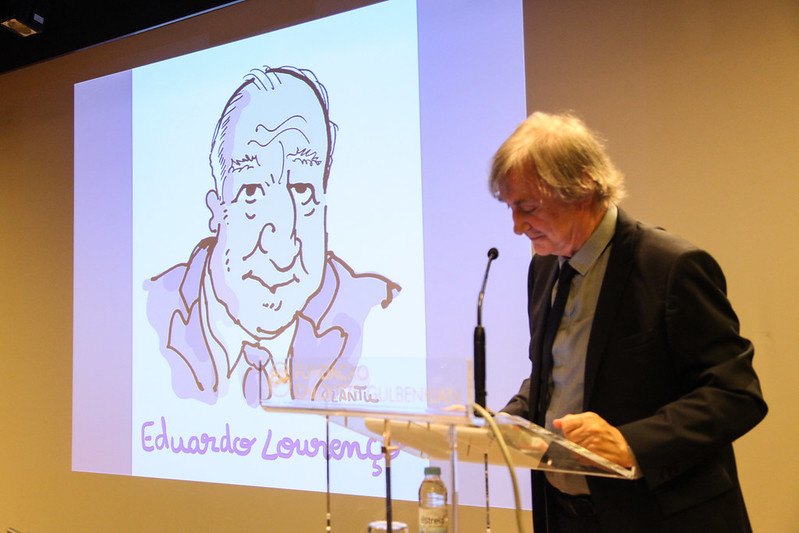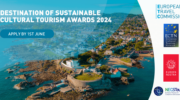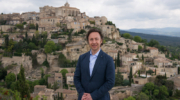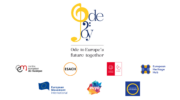French Cartoonist Plantu and Portuguese Philosopher Eduardo Lourenço received Helena Vaz da Silva European Award in Lisbon
The prestigious French editorial cartoonist Jean Plantureux, known as Plantu, and the prominent Portuguese philosopher Eduardo Lourenço received the Helena Vaz da Silva European Award for Raising Public Awareness on Cultural Heritage 2016 from the President of the Portuguese Republic Marcelo Rebelo de Sousa at a memorable ceremony held on the evening of 10 October at the Gulbenkian Foundation in Lisbon. The President of Portugal highlighted “the genius of the winners”, who “share a critical but never negative view of Europe” and “are great advocates of cultural diversity, tolerance and civilisational dialogue”. Rebelo de Sousa noted that “people such as Helena Vaz da Silva, Eduardo Lourenço and Plantu make us look to the future with hope and demonstrate that it is well worth fighting for culture and Europe.” Among the many personalities who attended the event was the newly elected United Nations Secretary-General António Guterres.
 “Even when we are critical of today’s Europe – its intolerance towards migrants and refugees, its incomprehension of its neighbours, its inability to rebuild itself and match the expectations that were in its genesis; even when Europe’s core values are threatened by various forms of populism, xenophobia and nationalism – we firmly believe in Europe. When we find Awards like this, we feel that it is well worth being European and fighting for freedom and democracy. We strongly believe that Europe’s civilisation, culture and heritage will prevail,” stated the President of the Portuguese Republic.
“Even when we are critical of today’s Europe – its intolerance towards migrants and refugees, its incomprehension of its neighbours, its inability to rebuild itself and match the expectations that were in its genesis; even when Europe’s core values are threatened by various forms of populism, xenophobia and nationalism – we firmly believe in Europe. When we find Awards like this, we feel that it is well worth being European and fighting for freedom and democracy. We strongly believe that Europe’s civilisation, culture and heritage will prevail,” stated the President of the Portuguese Republic.
Guilherme d’Oliveira Martins, President of the Jury of the Helena Vaz da Silva European Award – established in 2013 by Centro Nacional de Cultura in cooperation with the leading European heritage organisation Europa Nostra and Clube Português de Imprensa – made a laudatory speech about the Portuguese essayist. “For Eduardo Lourenço, heritage is the preservation of memory and the constant rethinking of what we receive from previous generations in the name of freedom, responsibility and the ability to better understand and respect each other.” Oliveira Martins emphasised that “this Award, given to a philosopher and an artist, is a warning against indifference, an alert for freedom.”
Denis de Kergorlay, Executive President of Europa Nostra, presented a profile of the chief cartoonist of France’s daily newspaper Le Monde. “Plantu is an ‘idealist humanist’. As President of the Foundation Cartooning for Peace, he acts as a unifying force of ‘idealist humanists’ against dictators, populists and sectarians. Plantu denounces violence towards humanity and nature on a global scale, using powerful weapons that are not detected at airports: a pen and a piece of paper. His cartoons – some 45,000 drawn over more than 40 years – are the result of an exceptional talent, but also of a deep sensitivity, generosity, curiosity and a wide cultural knowledge”. The Executive President of Europa Nostra concluded: “Continue with your mission to promote peace, culture and European values; we are all with you.”
In his acceptance speech, Eduardo Lourenço recalled Helena Vaz da Silva with emotion, highlighting “her serene courage, her discontented contentment, her insatiable curiosity, her notable contribution to the promotion of cultural heritage and European ideals, her love for others and the world”, and expressed his heartfelt thanks for this important European distinction bearing her name. Eduardo Lourenço welcomed the presence of António Guterres and stated that “his appointment as Secretary-General of the United Nations is a sign of hope for the world and a great source of pride for Portugal.”
Addressing the audience while showing a selection of his cartoons, Plantu spoke about Europe, wars, hope and crises, and stressed the need to promote dialogue and understanding between peoples, cultures and countries. He devoted special attention to Portugal, referring to the fado – a genre of traditional Portuguese song that is inscribed on UNESCO’s List of Intangible Cultural Heritage of Humanity – and the word saudade (longing) and drew a Portuguese guitar. Plantu also paid tribute to Eduardo Lourenço, António Guterres and Marcelo Rebelo de Sousa by drawing and giving them their respective cartoons.
Maria Calado, President of the Centro Nacional de Cultural, and Dinis de Abreu, President of the Clube Português de Imprensa, evoked Helena Vaz da Silva and justified the presentation of the Award – for the first time since its creation in 2013 – ex-aequo to “two staunch advocates of European ideals and culture”.
Europa Nostra’s Secretary General Sneška Quaedvlieg-Mihailović paid homage to the late Dutch journalist Pieter Steinz, who received a Special Mention of the Helena Vaz da Silva European Award in 2014. Steinz, who had suffered from ALS disease, passed away last August, at the age of 52. “Pieter was a true champion of Europe’s culture and values. His book Made in Europe – The Cultural Icons that Unite Us identifies and brings together over 200 symbols of Europe’s art and heritage which have a major influence in all parts of our continent. We are deeply grateful to Pieter Steinz for his outstanding contribution to promoting L’ Europe de la Culture et la culture en Europe”, stated the Secretary General of Europa Nostra.
The European Award for Raising Public Awareness on Cultural Heritage, named after the Portuguese journalist, writer, cultural activist and politician Helena Vaz da Silva (1939-2002), acknowledges exceptional contributions to the communication on cultural heritage and European ideals. The previous laureates of the Helena Vaz da Silva European Award are the Italian writer Claudio Magris (2013), the Turkish writer and Nobel Prize laureate Orhan Pamuk (2014) and Maestro Jordi Savall, musician and conductor from Catalonia, Spain (2015). This Award has the support of the Portuguese Secretariat of State for Culture, the Calouste Gulbenkian Foundation and the Turismo de Portugal.
Prior to the Helena Vaz da Silva Award Ceremony, there was a special session to celebrate the two Portuguese winners of the 2016 European Union Prize for Cultural Heritage / Europa Nostra Awards: the Cathedral and Diocesan Museum in Santarém (Conservation category), which was presented by Eva Raquel Neves; and the project for the Sustainable Development of Mourela Plateau in the Peneda-Gerês National Park (Education, Training and Awareness-Raising category), which was presented by Rita Ferreiro. The two projects received high praise from the President of the Portuguese Republic as well as the Minister of Culture Castro Mendes, whose message was read by the Secretary of State for Culture Miguel Honrado. The President of the Gulbenkian Foundation Artur Santos Silva congratulated the winners and highlighted the role of the Foundation in the study, restoration and conservation of heritage, affirming: “Without heritage there is no memory and without memory there is no identity.”
The entire event was conducted by Europa Nostra’s Secretary General Sneška Quaedvlieg-Mihailović and attended by 150 people.
Read the article
Público (Ceremony in Portuguese)
Watch Videos
TV Station RTP (Ceremony in Portuguese)
Visão (Highlights of Plantu's interview in French & Portuguese)







